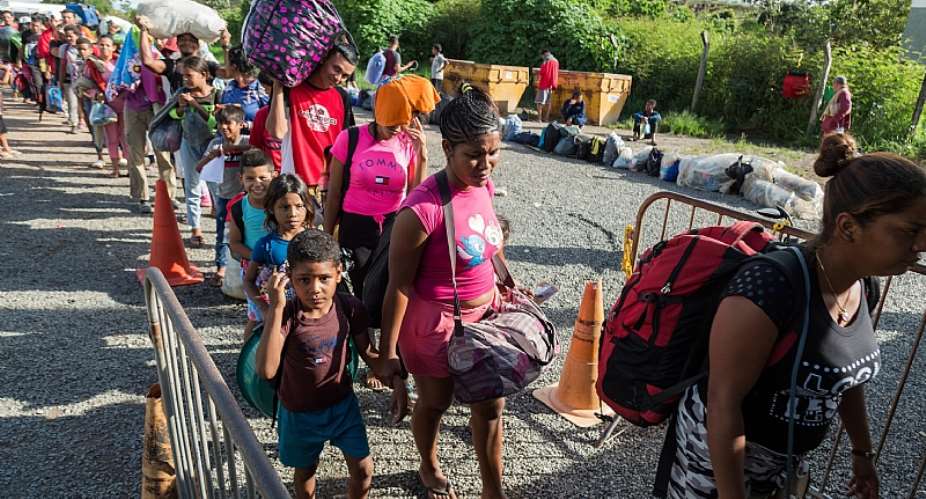Geneva/Panama City – Despite efforts by host countries to regularize and integrate refugees and migrants from Venezuela, more than four million people still face difficulties accessing food, shelter, health care, education and formal employment in Latin America and the Caribbean.
The latest Refugee and Migrant Needs Analysis (RMNA) for 2023 shows that many Venezuelan refugees and migrants in the region lack stable livelihood opportunities, making it difficult for them to effectively integrate and contribute to host communities.
The comprehensive needs analysis was conducted by the Regional Inter-Agency Coordination Platform for Refugees and Migrants from Venezuela (R4V), which is co-led by the International Organization for Migration (IOM) and UNHCR, the UN Refugee Agency.
Amidst a global and regional cost-of-living crisis, Venezuelans are at heightened risk of being victims of abuses like human trafficking, forced recruitment and gender-based violence.
In addition, the report finds that approximately 19 per cent of refugee and migrant children are not attending school, instead supporting their families with informal and underpaid jobs to make ends meet.
While more than 60 per cent of refugees and migrants from Venezuela are documented, this has not been enough to ensure a dignified life and adequate access to basic rights. More regular stay arrangements and increased investment in longer-term solutions in livelihoods and education – which benefit host communities as well – are key to self-reliance and inclusion.
"The regularization and documentation initiatives implemented in the region are the path to a dignified life for Venezuelan families," said Dr. Eduardo Stein, the Joint Special Representative of IOM and UNHCR for Refugees and Migrants from Venezuela.
“The fact that half of Venezuelans in the region are facing barriers to receiving health care and cannot afford three meals a day or access adequate housing, as the RMNA points out, highlights the urgent need for international support, so they have opportunities to be self-sufficient, effectively integrate into their host communities, and contribute to the development of the countries in the region.”
Even though regularization efforts have had positive results, one-third of Venezuelan refugees and migrants in Latin America and the Caribbean have not been able to regularize their status and are unable to support their families through underpaid and informal jobs.
Increased funding to countries in the region is direly needed. New investment can save lives, provide lasting stabilization and integration opportunities for millions of refugees and migrants, including those of other nationalities in transit, preventing them from embarking on dangerous journeys. Support to host communities also remains urgent.
R4V’s 228 partners support and complement governments in Latin America and the Caribbean, the primary responders, to address this situation. However, of the USD 1.72 billion requested by R4V in the Regional Refugee and Migrant Response Plan, barely 12 per cent of financial needs have been received to date.
According to official figures and estimates reported by host countries and compiled by the R4V Platform, there were more than 7.7 million refugees and migrants from Venezuela worldwide as of August 2023. Over 6.5 million of them are hosted in 17 countries in Latin America and the Caribbean.





 Bribery allegations: EC withdraws 2 staff in ongoing Ejisu by-election, begins i...
Bribery allegations: EC withdraws 2 staff in ongoing Ejisu by-election, begins i...
 Ejisu by-election: 106,816 voters decide NPP’s bid to retain parliamentary major...
Ejisu by-election: 106,816 voters decide NPP’s bid to retain parliamentary major...
 2024 election: NDC cannot stop Bawumia’s one-touch victory on December 7 – Richa...
2024 election: NDC cannot stop Bawumia’s one-touch victory on December 7 – Richa...
 Wife jailed 6years for cooking husband with hot water
Wife jailed 6years for cooking husband with hot water
 Kenya Airways ponders direct flights to Kumasi Airport
Kenya Airways ponders direct flights to Kumasi Airport
 ‘It's sad; Glovo is leaving due to high taxes, currency depreciation, high fuel’...
‘It's sad; Glovo is leaving due to high taxes, currency depreciation, high fuel’...
 I never imagined dumsor would return — Yvonne Nelson calls on Ghanaians for 2nd ...
I never imagined dumsor would return — Yvonne Nelson calls on Ghanaians for 2nd ...
 Consider paying monthly stipends to pastors — Ghana Baptist Convention President...
Consider paying monthly stipends to pastors — Ghana Baptist Convention President...
 Chieftaincy disputes remains one of the major threats to Ghana’s peace — Nationa...
Chieftaincy disputes remains one of the major threats to Ghana’s peace — Nationa...
 Dumsor making water treatment, supply to Mfantseman Area difficult — GWCL
Dumsor making water treatment, supply to Mfantseman Area difficult — GWCL
